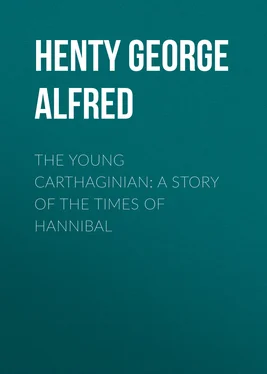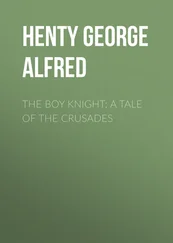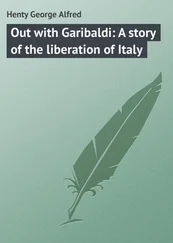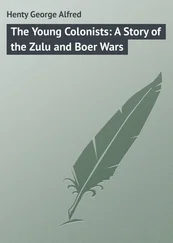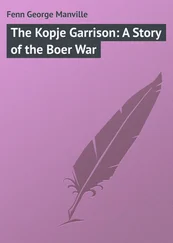George Henty - The Young Carthaginian - A Story of The Times of Hannibal
Здесь есть возможность читать онлайн «George Henty - The Young Carthaginian - A Story of The Times of Hannibal» — ознакомительный отрывок электронной книги совершенно бесплатно, а после прочтения отрывка купить полную версию. В некоторых случаях можно слушать аудио, скачать через торрент в формате fb2 и присутствует краткое содержание. Жанр: foreign_children, foreign_antique, foreign_prose, prose_military, на английском языке. Описание произведения, (предисловие) а так же отзывы посетителей доступны на портале библиотеки ЛибКат.
- Название:The Young Carthaginian: A Story of The Times of Hannibal
- Автор:
- Жанр:
- Год:неизвестен
- ISBN:нет данных
- Рейтинг книги:5 / 5. Голосов: 1
-
Избранное:Добавить в избранное
- Отзывы:
-
Ваша оценка:
- 100
- 1
- 2
- 3
- 4
- 5
The Young Carthaginian: A Story of The Times of Hannibal: краткое содержание, описание и аннотация
Предлагаем к чтению аннотацию, описание, краткое содержание или предисловие (зависит от того, что написал сам автор книги «The Young Carthaginian: A Story of The Times of Hannibal»). Если вы не нашли необходимую информацию о книге — напишите в комментариях, мы постараемся отыскать её.
The Young Carthaginian: A Story of The Times of Hannibal — читать онлайн ознакомительный отрывок
Ниже представлен текст книги, разбитый по страницам. Система сохранения места последней прочитанной страницы, позволяет с удобством читать онлайн бесплатно книгу «The Young Carthaginian: A Story of The Times of Hannibal», без необходимости каждый раз заново искать на чём Вы остановились. Поставьте закладку, и сможете в любой момент перейти на страницу, на которой закончили чтение.
Интервал:
Закладка:
The fight raged hand to hand, bows twanged and arrows flew, the light javelins were hurled at close quarters with deadly effect, the shrill cries of the Numidians mingled with the deeper shouts of the Iberians and the yells of the natives. Hamilcar stood for a minute irresolute.
“They are neglecting us,” he said to Adherbal, “until they have finished with the main body; we must go to their assistance. At present our men are fighting without order or regularity. Unless their leaders are with them they are lost, our presence will encourage and reanimate them. Bring up the elephants quickly.”
The three elephants were at once brought forward, their drivers mounted on their necks. Four soldiers with their bows and arrows took their places on the back of each, the general with the rest of the fighting men followed closely behind.
At the orders of their drivers the well trained animals broke into a trot, and the party advanced from the shadow of the grove. The natives scattered between it and the wood fired a volley of arrows and then broke as the elephants charged down upon them. Trained to warfare the elephants dashed among them, catching some up in their trunks and dashing them lifeless to the ground, knocking down and trampling upon others, scattering terror wherever they went, while the archers on their backs kept up a deadly fire. As soon as the way was open Hamilcar led the little party on foot at full speed towards the wood.
As he entered it he ordered his trumpeter to blow his horn. The well known signal revived the hopes and courage of the sorely pressed troops, who, surprised and discouraged, had been losing ground, great numbers falling before the arrows and javelins of their swarming and active foes. The natives, surprised at the trumpet sound in the rear, paused a moment, and before they could turn round to face their unexpected adversaries, Hamilcar with his little band burst his way through them and joined his soldiers, who, gathered now in a close body in the centre of the grove, received their leader with a shout of welcome.
Hamilcar’s measures were promptly taken. He saw that if stationary his band must melt away under the shower of missiles which was being poured upon them. He gave the command and the troops rapidly formed into three groups, the men of each corps gathering together. Adherbal, who was in command of the Numidians, placed himself at their head, Giscon led the Iberians, and Hamilcar headed the heavily armed troops, Malchus taking his place at his side. Hamilcar had already given his orders to the young officers. No response was to be made to the fire of the arrows and javelins, but with spear, sword, and battleaxe the troops were to fall upon the natives.
“Charge!” he shouted in a voice that was heard above the yells of the barbarians. “Clear the wood of these lurking enemies, they dare not face you. Sweep them before your path.”
With an answering shout the three bodies of men sprang forward, each in a different direction. In vain the natives poured in volleys of arrows and javelins; many fell, more were wounded, but all who could keep their feet rushed forward with fury upon their assailants.
The charge was irresistible. The natives, fighting each for himself, were unable for a moment to withstand the torrent, and, vastly superior in numbers as they were, were driven headlong before it. When they reached the edge of the wood each of the bodies broke into two. The Numidians had directed their course towards their horses, which a party of their own men were still defending desperately against the attacks of a large body of natives. Through these they cut their way, and springing upon their steeds dashed out into the plain, and sweeping round the grove fell upon the natives there, and cut down the parties of men who emerged in confusion from its shelter, unable to withstand the assaults of Hamilcar and his infantry within.
The heavy infantry and the Iberians, when they gained the edge of the wood, had swept to the right and left, cleared the edge of the grove of their enemies until they met, then joining they again plunged into the centre. Thus they traversed the wood in every direction until they had completely cleared it of foes.
When the work was done the breathless and exhausted troops gathered outside, in the light of the moon. More than half their number had fallen; scarce one but was bleeding from wounds of arrow or javelin. The plain beyond was thickly dotted to the foot of the hills with the bodies of the natives who had been cut up by the Numidian horse or trampled by the elephants, while the grove within was thickly strewn with their bodies.
As there was no fear of a renewal of the attack, Hamilcar ordered the men to fall out of ranks, and the hours until daybreak were passed in extracting arrows and binding up wounds, and in assisting their comrades who were found to be still living in the grove. Any natives still breathing were instantly slain.
Hamilcar found that a party of the enemy had made their way into his own camp. His tent had been hastily plundered, but most of the effects were found in the morning scattered over the ground between the groves and the hills, having been thrown away in their flight by the natives when the horsemen burst out of the wood in pursuit. Of the slaves and attendants several had been killed, but the greater portion had, when Hamilcar left the grove with the troops, climbed up into trees, and remained there concealed until the rout of the assailants.
It was found in the morning that over one hundred and fifty of the three hundred Carthaginian troops had fallen, and that four hundred of the natives had been slain either in the grove or in the pursuit by cavalry.
The following day two envoys arrived from the hostile tribe offering the submission of their chief.
As pursuit in the hills would be useless Hamilcar offered them comparatively easy terms. A heavy fine in horses and cattle was to be paid to the republic, and ten of the principal members of the tribe were to be delivered up as hostages for their future good behaviour. The next day the hostages were brought into the camp with a portion of the ransom; and Hamilcar, having thus accomplished the mission he had been charged to perform, marched away with his troops to Carthage.
As they approached the coast the whole character of the scenery changed. The desert had been left behind them, and they entered a fertile tract of country which had been literally turned into a garden by the skill and industry of the Carthaginian cultivators, at that time celebrated throughout the world for their knowledge of the science of agriculture. The rougher and more sterile ground was covered with groves of olive trees, while rich vineyards and orchards of fig and other fruit trees occupied the better soil. Wherever it was possible little canals leading water from reservoirs and dammed up streams crossed the plains, and every foot of the irrigated ground was covered with a luxuriant crop.
The villages were scattered thickly, and when the troops arrived within a day’s march of Carthage they came upon the country villas and mansions of the wealthy inhabitants. These in the richness of their architecture, the perfection and order of their gardens, and the beauty and taste of the orchards and grounds which surrounded them, testified alike to the wealth and taste of their occupants.
Fountains threw their water into the air, numerous waterfalls splashed with a cool, soothing sound over artificial rocks. Statues wrought by Greek sculptors stood on the terraces, shady walks offered a cool retreat during the heat of the day, the vine, the pomegranate, and the fig afforded refreshment to the palate as well as pleasure to the eye. Palm trees with their graceful foliage waved gently in the passing breezes. All the countries with which the Carthaginians traded had supplied their contingent of vegetation to add to the beauty and production of these gardens, which were the admiration and envy of the civilized world.
Читать дальшеИнтервал:
Закладка:
Похожие книги на «The Young Carthaginian: A Story of The Times of Hannibal»
Представляем Вашему вниманию похожие книги на «The Young Carthaginian: A Story of The Times of Hannibal» списком для выбора. Мы отобрали схожую по названию и смыслу литературу в надежде предоставить читателям больше вариантов отыскать новые, интересные, ещё непрочитанные произведения.
Обсуждение, отзывы о книге «The Young Carthaginian: A Story of The Times of Hannibal» и просто собственные мнения читателей. Оставьте ваши комментарии, напишите, что Вы думаете о произведении, его смысле или главных героях. Укажите что конкретно понравилось, а что нет, и почему Вы так считаете.
